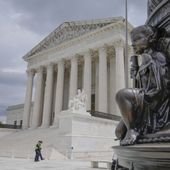The company hired to monitor aid under the U.N. oil-for-food program in Iraq failed to staff key checkpoints, used unauthorized subcontractors, and could not account for “massive discrepancies” between reported and actual shipments of aid, according to an internal U.N. audit.
Switzerland-based Cotecna Inspection SA has already figured as a key player in the $10 billion scandal when it was revealed that U.N. Secretary-General Kofi Annan’s son, Kojo, worked for Cotecna and later served as a consultant to the company when it won the lucrative U.N. contract in 1998.
Records from the U.N. agency overseeing the oil-for-food program “show massive discrepancies between Cotecna reports and U.N. agency reports” for the value of the shipments into northern Iraq, according to a summary of the audit obtained by The Washington Times.
The oil-for-food program is the subject of investigations in Baghdad, Washington and within the United Nations itself.
The General Accounting Office (GAO) has estimated that the regime of Saddam Hussein, the Iraqi dictator who was ousted last year by U.S.-led forces, siphoned off more than $10 billion from the program in illegal oil sales and inflated contracts for food and humanitarian aid.
The audit, conducted by the United Nations’ Office of Internal Oversight Services, covers only a five-month period ending in October 2002, but suggests that there were long-standing problems with the six-year program. The program began in December 1996.
Details of the previously undisclosed internal audit were leaked earlier this week to Mineweb.com, an Internet-based trade publication that follows the mining industry.
In perhaps the most damning finding, the auditors found that Cotecna did no independent inspections on nearly $1 billion worth of aid shipments into northern Iraq in the first three years of its contract.
Saddam was routinely accused of inflating contract deals, reselling goods and demanding contractor kickbacks as a way to sidestep international economic sanctions.
When Cotecna began inspections in 2001, it reported a difference of $111 million in just over a year between what contractors said they were importing to Iraq and the value of the actual shipments.
The audit also found that Cotecna failed to provide the required 24-hour monitoring of key border posts and was “rubber-stamping” cargo manifests on Iraqi government purchases.
Nicolas Giannakopoulos, head of the Geneva-based Organized Crime Observatory, said Cotecna lacked the manpower to carry out the contract.
“Millions of tons of goods were imported for distribution or sale to the civilian population, but there were only 50 Cotecna staffers to check and supervise,” he said.
“How could it have been possible technically for it to monitor this influx?” he asked.
Mr. Giannakopoulos said he had looked at Cotecna’s monitoring operations in Iraq and concluded that “the door was left open for money to be made.”
U.N. officials have resisted calls by the GAO and others to release the internal management audits of the oil-for-food program, saying they were never meant for public distribution.
“We sure asked for them,” GAO investigator Joseph A. Christoff said at a House hearing late last month.
An investigative panel appointed by Mr. Annan and led by former Federal Reserve Board Chairman Paul Volcker will be allowed to see the internal audits. Mr. Volcker said his panel is weighing whether to share the audits with other investigators.
The Office of Internal Oversight Services said in its summary that Benon Sevan, the U.N. official who ran the oil-for-food program, was briefed in December 2002 on the findings of the audit.
Mr. Sevan is on leave and recently announced his intention to retire from the world body, after his name appeared on a list of about 270 government officials, corporations, journalists and other figures who reportedly received secret vouchers from Saddam’s government to circumvent the oil-for-food program. He has denied any wrongdoing.
Other irregularities highlighted in the audit include the following:
cIllegal changes to the bid terms when Cotecna first won the contract, and “inappropriate” increases in personnel costs approved by Mr. Sevan after the contract was awarded.
cPayments to Cotecna for contract employees who never worked, despite four years of complaints from U.N. officials.
Unauthorized use of U.N. medical and office facilities by Cotecna employees.
Cotecna’s hiring of a subcontractor in violation of the bid terms and its application — for unspecified reasons for accreditation — with the Iraqi Ministry of Trade as a registered contractor. Cotecna was not reprimanded in either case, according to the audit.
In Baghdad yesterday, interim Oil Minister Ibrahim Bahr al-Ulloum told the Agence France-Presse news service that the new Iraqi government would cooperate fully with the Volcker panel, giving it time to complete its work and supplying documents obtained from Saddam’s files.
“We believe the former regime siphoned off enormous riches from the Iraqi people, and if it is possible to retrieve a part of them, even a part, it will be worth it,” he said.
Deputy Secretary of State Richard L. Armitage told a Senate Foreign Relations Committee hearing on Tuesday that the Bush administration is cooperating fully with the probes into the U.N. scandal. But he said it was unlikely that the bulk of the estimated $10 billion stolen under the program would be recovered.
“I don’t think the monies [recovered] will be substantial in terms of billions and billions of dollars. I don’t think it runs that high,” he said.
“But, you know, follow the trail and follow the money.”
c Jay Bushinsky contributed to this report from Jerusalem.



Please read our comment policy before commenting.